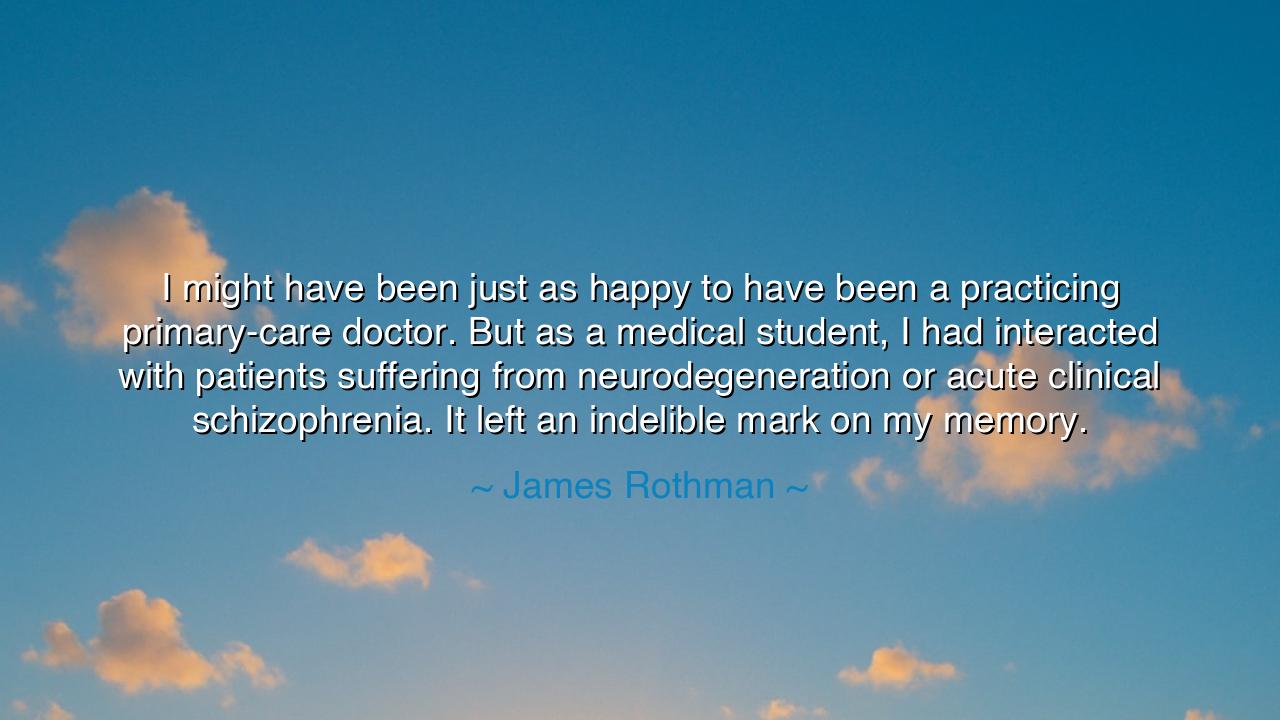
I might have been just as happy to have been a practicing
I might have been just as happy to have been a practicing primary-care doctor. But as a medical student, I had interacted with patients suffering from neurodegeneration or acute clinical schizophrenia. It left an indelible mark on my memory.






The words of James Rothman—“I might have been just as happy to have been a practicing primary-care doctor. But as a medical student, I had interacted with patients suffering from neurodegeneration or acute clinical schizophrenia. It left an indelible mark on my memory.”—speak with the weight of destiny and the tenderness of compassion. They reveal the mystery of vocation: that though we may imagine one path, it is often the encounter with human suffering that shapes the true calling of our lives. For in witnessing the brokenness of others, Rothman was marked forever, and from that mark came a devotion that reached beyond the ordinary and touched the eternal.
The ancients taught that the soul finds its direction not in ease but in trial. Rothman, as a medical student, looked into the eyes of those afflicted with neurodegeneration, with schizophrenia, with minds unraveling like threads in a storm. These were not cases in textbooks but living human beings—fragile, suffering, crying out from within illnesses that robbed them of memory, reason, and peace. Such encounters are not forgotten; they carve themselves into the heart like inscriptions upon stone. It is this mark, this indelible memory, that guided him toward the path of research and discovery, where he would labor not only for his own fulfillment but for the healing of generations.
Consider the story of Alois Alzheimer, who in the early 1900s studied a patient named Auguste Deter. She suffered from memory loss, confusion, and disorientation. Alzheimer did not dismiss her as hopeless but pursued her case with curiosity and compassion, eventually identifying the disease that now bears his name. Like Rothman, his career was not born of ambition alone but of the searing impression left by a single human life. This is the pattern of history: the great strides in medicine are often inspired not by abstract goals but by the intimate suffering of patients whose faces remain etched in memory.
Rothman’s reflection also reveals the nobility of the primary-care doctor, whom he might have become. These guardians of daily health embody constancy, tending to the wounds of body and spirit alike. Yet destiny sometimes calls us beyond what we think we desire. For Rothman, the sight of patients with ravaged minds demanded more than comfort—it demanded inquiry, discovery, a search for answers hidden in the deepest mysteries of biology. The path of the healer took him from the bedside to the laboratory, yet the heartbeat of his work remained the same: compassion for the suffering he could not forget.
There is a lesson here for all: what shapes us most deeply is not what we plan, but what touches us at the core of our being. When we encounter suffering—whether of the sick, the poor, the oppressed—we are offered a choice: to turn away and forget, or to let it mark us, to let it transform our lives into instruments of service. Rothman allowed the anguish of others to become the fire that forged his life’s work. And in this we see the truth: memory is not only a burden but a guide, if we are brave enough to follow where it leads.
But let us also recognize the courage required to face the afflicted. To sit with the schizophrenic, to witness the decline of those with neurodegeneration, is to confront the fragility of our own humanity. Many recoil; some dismiss. But the true healer, the true servant of mankind, does not flee. He remains, he listens, he remembers. It is from such endurance that wisdom grows, and from such wisdom that discoveries emerge that may one day break the chains of disease.
Practical action lies before us all: do not close your eyes to suffering. When life offers you a moment that pierces your heart, let it shape you rather than frighten you. If you are called to science, let that memory fuel your pursuit of truth. If you are called to daily acts of care, let that compassion shine through your service. And in whatever path you walk, hold close the lives of those who have touched you, for they are the silent teachers of your destiny.
So let us heed the teaching of James Rothman. To be marked by suffering is not to be weakened, but to be awakened. His words remind us that the true origin of greatness lies not in ambition, but in the willingness to let another’s pain become a seed of transformation within us. May we, too, carry the indelible marks of compassion, and may those marks guide our steps toward service, discovery, and the healing of the world.






AAdministratorAdministrator
Welcome, honored guests. Please leave a comment, we will respond soon